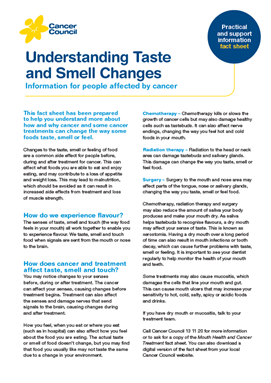- Home
- Cancer Information
- Managing side effects
- Taste and smell changes
- How do we experience flavour?
How do we experience flavour?
The senses of taste, smell and touch (the way food feels in your mouth) all work together to enable you to experience flavour. We taste, smell and touch food when signals are sent from the mouth or nose to the brain.
Sense of taste
Taste is experienced when food or drink, mixed with saliva, reaches tastebuds located all over the tongue and inside the mouth. Tastebuds detect five basic tastes: sweet, salty, sour, bitter, and savoury (umami). These tastes are the building blocks of flavour, and they combine with the senses of smell and touch to give rise to many flavours.
Sense of smell
Smell is experienced when odour particles are detected in the air and enter the nose either through the nostrils or the mouth. Chewing and swallowing food can release aromas that travel through the back of the mouth and up into the nasal passage.
Sense of touch
The feeling of food in the mouth, or on the tongue, is important in the enjoyment of eating. During cancer treatment, food can feel ‘rough’ or ‘claggy’ and is sometimes described as ‘tasting like cardboard’.
Because they are so closely linked with taste, problems with the senses of smell or touch can be mistaken as a taste problem. This can be confusing and make the actual problem difficult to identify and treat. For example, a dry mouth or an offensive odour experienced in the mouth could be incorrectly described as a problem with the tastebuds.
More resources
Emma McKie, Clinical Dietitian, Peter MacCallum Cancer Centre, VIC; Cecilia Barling, Consumer; Dawn Bedwell 13 11 20 Consultant, Cancer Council Queensland, QLD; Gillian Blanchard, Oncology Nurse Practitioner, Calvary Mater Newcastle, NSW; Dr Karen Taylor, Radiation Oncologist, GenesisCare Radiation Oncology, VIC.
View the Cancer Council NSW editorial policy.
View all publications or call 13 11 20 for free printed copies.
Need to talk?
Support services
Coping with cancer?
Speak to a health professional or to someone who has been there, or find a support group or forum
Need legal and financial assistance?
Pro bono services, financial and legal assistance, and no interest loans
Cancer information
Learn more about chemotherapy
Chemotherapy is the use of drugs to kill or slow the growth of cancer cells
What is cancer?
How cancer starts and spreads


